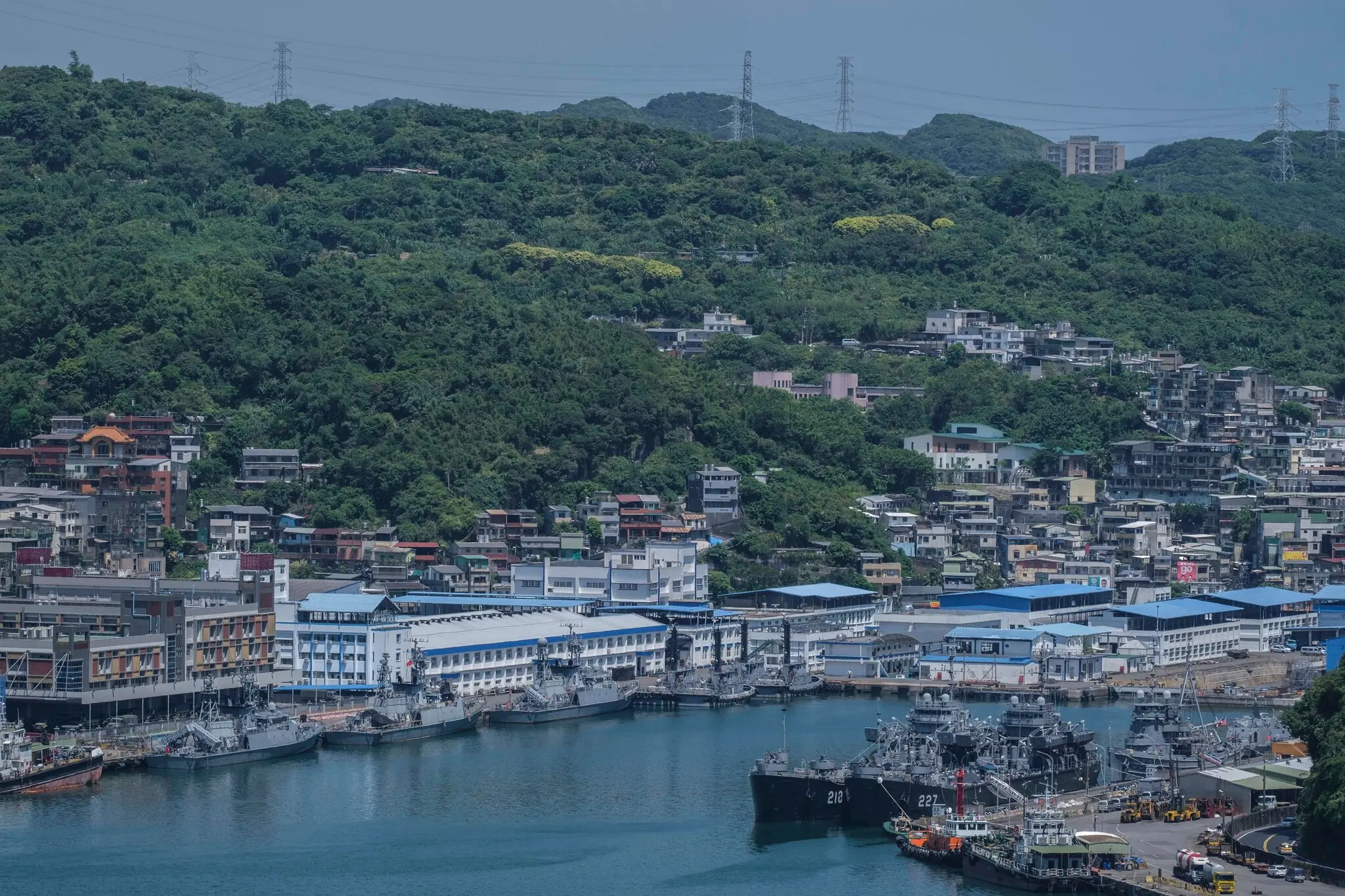
China sent a force of warships and aircraft into waters and airspace near Taiwan on Friday, defying international criticism of its military exercises and demonstrating the country’s growing appetite for confrontation over the island that it claims as its territory.
The military exercise came a day after at least 11 Chinese missiles landed in waters to the north, south and east of Taiwan, driving fears that Chinese forces were practicing for a hypothetical attempt to encircle and attack the island. On Friday, China’s military deployed fighter jets, bombers, destroyers and escort ships to waters near the island, where a high-profile visit by Speaker Nancy Pelosi this week infuriated Beijing.
Some of those Chinese warplanes and warships on Friday crossed the informal median line in the Taiwan Strait, which separates the island from the Chinese mainland, Taiwan’s defense ministry said.
More worrisome for some analysts, Beijing also canceled or suspended talks with the United States on climate change and military coordination — raising concerns that an accidental encounter could slide into open hostilities. In halting the talks, Beijing struck directly at the Biden administration’s strategy of confronting China on points of dispute, such as Beijing’s crackdown on Hong Kong, while trying to collaborate with it to tackle global threats like climate change.
John Kirby, a spokesman for the U.S. National Security Council, on Friday condemned the shutdown of military communications and climate talks as “irresponsible.” But he suggested they might only be temporary setbacks in the overall U.S.-China relationship, saying such responses were “of a piece of their playbook.”
The maneuvers, experts said, suggested a plan to blockade Taiwan, which is “quite a bit more than we’ve seen before,” said Andrew Mertha, director of the China Global Research Center at the Johns Hopkins School of Advanced International Studies. “We’re seeing what China is capable of doing in a war context.”
In the history of U.S.-China relations, “suspension of military discussions is always the first casualty,” Mr. Mertha added. “It’s dangerous simply because it’s precisely at crisis moments like this that you have to have clear uninterrupted lines of communication.”
Relations between China and the United States, already at a low before Ms. Pelosi’s visit, are now in a downward spiral.
Karine Jean-Pierre, the White House press secretary, on Friday denounced China’s military drills and stressed that U.S. policy on Taiwan was unchanged.
“We will not seek or do not want a crisis,” she said. “At the same time we will not deter from operating in the seas and skies of the Western Pacific.”

Wang Yi/Xinhua, via Associated Press
But the two global powers are staking out hard, ideologically driven stances that make compromise challenging, heading into a deep chill in relations that could reshape the geopolitical landscape and have ramifications on global issues like world markets and climate change.
China has long claimed Taiwan, a self-governing democracy off its southern coast, and regarded any visit by an American politician as an affront, let alone one by Ms. Pelosi, the highest-ranking U.S. official to go there since 1997.
During her visit this week, Ms. Pelosi met with Taiwan’s president, lawmakers and human rights activists, hailing the island’s commitment to democracy. She kept up her criticism of Beijing on Friday, saying in Tokyo that China “may try to keep Taiwan from visiting or participating in other places but they will not isolate Taiwan.”
After Ms. Pelosi departed, Beijing said it would impose unspecified sanctions against her and her family members.
Beijing has found it hard to reconcile Washington’s approach of simultaneous strategic cooperation and competition, because it sees cooperation as giving Washington leverage, said Amanda Hsiao, a senior analyst for China at the International Crisis Group.
“In canceling all these exchanges, though, Beijing is really pulling away the last strings in an already threadbare relationship,” Ms. Hsiao said. “It shows that there is little left in the bilateral relationship that Beijing can use to register its protests over Taiwan.”
The end of defense exchanges worried some experts, who said it left an opening for dangerous interactions between the Chinese and American militaries in the South China Sea and around the region.
The concern about the potential consequences of any such accidental — or intentional — conflict was clear on Friday. Prime Minister Fumio Kishida of Japan called on China to halt its military exercises after meeting in Tokyo with Ms. Pelosi, who has stopped in several countries allied with the United States.
China had fired five missiles on Thursday that landed in waters claimed by Japan for its exclusive economic use. Mr. Kishida said the drills were having “a serious impact on the peace and stability of the region and the world,” Kyodo News reported.

Prime Minister Fumio Kishida of Japan with Speaker Nancy Pelosi in Tokyo on Friday. Mr. Kishida said the Chinese military exercises were having “a serious impact on the peace and stability of the region and the world.” Kyodo News, via Associated Press
Zha Daojiong, a professor of international studies at Peking University, said that the decision to cancel high-level exchanges would not necessarily rule out further cooperation at lower levels of government.
“It is quite possible for the suspension to cover bilateral contacts at the high levels only,” said Mr. Zha. On the subject of climate talks, for example, “it should not be surprising for Chinese and American climate officials to exchange ideas at multilateral forums,” he said.
Besides demonstrating Beijing’s displeasure with Ms. Pelosi’s visit, the drills — which China has said would be held in six zones encircling Taiwan — appear to have been designed as a trial run for sealing off the island as part of a potential invasion. China’s leaders, including the current president, Xi Jinping, have long said that Taiwan must eventually be brought under Beijing’s control, by force if necessary.
Taiwan has faced such threats for decades, and an uneasy sense of normalcy prevailed on Friday, according to Jason Hsu, a former lawmaker with the opposition Kuomintang. But Mr. Hsu said that many people had a false sense of security.
“We are talking about missiles from China across the sky, and everyone is sleeping like a log,” he said.
Chinese Missiles Strike Near Taiwan
Japan described the paths of nine Chinese missiles, including five that Japan said landed in its exclusive economic zone. The paths of other missiles are not known.
Business leaders in Taiwan, whose largest trading partner is China, have expressed concern about the potential for economic damage. Nine business groups, including the influential Chinese National Federation of Industries, issued a joint statement on the eve of the drills, noting the economic repercussions of the war in Ukraine and appealing to “both sides of the strait not to misjudge the situation.”
Criticism of China’s actions by the United States and its allies prompted Wang Yi, China’s foreign minister, to walk out of a gala dinner in Cambodia’s capital on Thursday night, moments before diplomats attending a regional conference were to be seated. Japan’s foreign minister, Yoshimasa Hayashi, had just issued a formal protest to China when Mr. Wang left.
Earlier in the day, Mr. Wang accused the United States of instigating the situation around Taiwan. “It is the United States that stirred up the trouble, it is the United States that created the crisis, and it is also the United States that kept escalating tensions,” Mr. Wang told foreign ministers attending the conference.
On Friday, Secretary of State Antony J. Blinken, speaking to reporters at the end of the meeting, described the Chinese military exercises as a “significant escalation” and having “no justification.”
The Chinese drills have put the United States in a delicate position. While the Pentagon wants to project strength in the region, it is also sensitive to the risk that a military miscalculation could cause an unintended escalation.
The Biden administration is intent on avoiding an incident like the 2001 collision between an American intelligence plane and a Chinese fighter jet over waters off China’s southern coast. The U.S. plane made a forced landing in a southern province of China, and more than 20 crew members were taken captive for 11 days.
Mr. Kirby, the National Security Council spokesman, said on Thursday that the U.S. military had ordered the U.S.S. Ronald Reagan to “remain on station” in the region but some distance from the entrance to the Taiwan Strait. That represents a more cautious move than one made during a crisis in 1996, when President Bill Clinton moved aircraft carriers closer to the strait.
The United States will resume “standard air and maritime transits through the Taiwan Strait in the next few weeks,” Mr. Kirby added.
In Washington, a former C.I.A. analyst, John Culver, said on Thursday at a meeting of the Center for Strategic and International Studies, a research group, that a new low had been reached between the United States and China.
“We’re in a new era,” said Mr. Culver, who was the national intelligence officer for East Asia at the National Intelligence Council from 2015 to 2018. “It’s not the mid-’90s anymore. The context is entirely different.”

Lam Yik Fei for The New York Times
FEATURED IMAGE: Taiwanese navy ships in Keelung, Taiwan, on Friday. Taiwan’s defense ministry said Chinese ships and planes crossed the informal median line in the Taiwan Strait on Friday. Lam Yik Fei for The New York Times
By Jane Perlez, Alexandra Stevenson, John Liu and Michael Crowley/The New York Times



